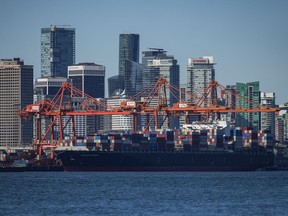
Article content
Grain terminal workers in Metro Vancouver are on strike, and picket lines went up Tuesday morning.
Advertisement 2
Story continues below
Article content
On Monday, before this strike, Wade Sobkowich, executive director of the Western Grain Elevator Association (WGEA) in Winnipeg, told me, referring to an earlier shutdown, “You don’t ever catch back up, but the system was closing in on re-balancing as of last week. CN was satisfying 87% of demand and CP was 79% last week.”
The Canola Council of Canada (CCC) is deeply concerned about the work stoppage at the Vancouver grain terminals. As a critical hub for Canadian canola exports, the Vancouver grain terminals are vital to the industry’s economic interests.
“Access to export markets is critically important for the Canadian canola industry,” said Chris Davison, CCC president & CEO. “A work stoppage at the Vancouver grain terminals will cause significant financial and reputational harm when the whole industry, from farmers to processors to exporters, is already facing significant market challenges and headwinds. We urge the federal government to take all necessary measures to ensure Canadian canola can reach international markets through the Port of Vancouver.”
Article content
Advertisement 3
Story continues below
Article content
Given current circumstances, the federal government must resolve this work stoppage swiftly to avoid additional harm to the Canadian canola industry.
This strike involves 650 workers at the six main bulk grain terminals at the Port of Vancouver.
The Grain Workers Union Local 333, part of the International Longshore and Warehouse Union (ILWU) Canada, issued a 72-hour strike notice. Operations at terminals owned by companies like Viterra, Richardson, Cargill, G3, and others are at risk. The five-year collective agreement with the Vancouver Terminal Elevators’ Association expired on December 31, 2023, prompting the labour action.
The Grain Growers of Canada (GGC) said the Grain Workers Union (GWU) Local 333 strike at the Port of Vancouver could halt all bulk grain shipments. The strike threatens the livelihoods of prairie grain farmers who rely on the port to export most of their crops.
Advertisement 4
Story continues below
Article content
With last month’s rail stoppages, GGC warns that this strike could result in a daily loss of $35 million in exports, damaging Canada’s international trading reputation. They are urging the federal government to intervene before the strike takes effect.
Sobkowich confirmed that on Sept. 12, the GWU completed an internal strike vote, gaining a mandate to trigger a 72-hour notice for a potential strike within the following 60 days. On Sept. 21 the GWU issued an official strike notice, which took effect Tuesday.
Negotiation meetings between the Vancouver Terminal Elevator Association (VTEA) and the GWU were held on Sept. 16, 17, and 19, attempting to finalize a deal. While making progress on direct wages, significant disagreements remained regarding benefits.
Advertisement 5
Story continues below
Article content
As talks had resumed, the Minister of Labour rejected the VTEA’s request for a member vote under section 108.1 of the Canada Labour Code. However, those talks broke down on Sept. 20, leading to a strike notice on September 21, with no new bargaining dates set.
The strike will fully halt operations at Vancouver’s six major bulk grain export terminals: Alliance Grain Terminal, Cascadia Terminal, Cargill, G3 Terminal, Pacific Elevators, and Richardson International.
While under clause 87.7 of the Canada Labour Code, “grain” is classified as essential for loading vessels by stevedoring companies, this designation does not extend to grain workers in terminal operations. Consequently, this strike will severely impact the loading and shipping of bulk grain, potentially disrupting grain exports and creating significant delays in the supply chain.
Advertisement 6
Story continues below
Article content
No matter what, we need to keep our rail system going. I know there is blame to go around until the cows come. However, I like President Ronald Reagan’s statement: “You have not failed at anything until you blame someone else.” Also, “You can do almost anything if you don’t care who gets the credit.”
Professor Dr. Sylvain Charlebois of the Agri-Food Analytics Lab at Dalhousie University, said, “We should recognize the railway workers’ rights argument; they are entitled to such rights. For food, intervention was crucial when evaluating the broader consequences. The stakes involved extended beyond mere economic or financial considerations.”
Carl Stewart, a Manitoba farmer and director with the WGA, criticized the recent work stoppage as unacceptable.
Advertisement 7
Story continues below
Article content
He noted that this is the 16th major port and rail disruption since 2010 and expressed frustration that no proactive measures have been established to address these issues in advance.
“We’re waiting until it’s a big issue, and everybody’s paying the price,” Stewart said emphasizing that the negotiations should have been resolved months ago rather than allowing the entire country to be held hostage. He advocates for rail and port services to be deemed essential to prevent future disruptions.
Stewart also pointed out that for every day without rail service, it will take the agriculture industry about a week to catch up.
Sobkowich highlighted the grain industry’s significant challenges during work stoppages, particularly in meeting customer delivery windows. Even the strike threat forces the industry to slow down sales and make alternative arrangements, causing damage whether a strike occurs. When strikes happen, they harm Canada’s reputation as a reliable grain supplier, leading customers to source products from other countries to ensure supply certainty.
Sobkowich likened Canada’s grain transportation system to a banana republic due to the frequent disruptions, which make Canada appear unreliable as a supplier despite the high quality of its grain. This unreliability pushes customers to adjust their sourcing strategies, mixing Canadian grain with lower-quality products from other countries.
— Harry Siemens, a farm journalist and advocate for over 53 years, shares the story of farming and food production to help people understand where their food comes from.
Article content
Comments